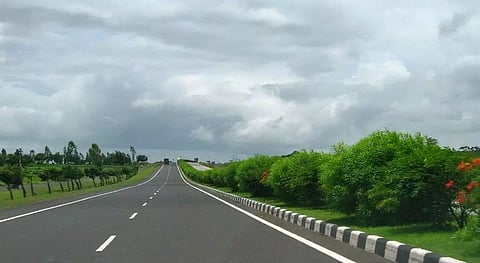
- Home
- Live Blog
- Breaking News
- Top Headlines
- Cities
- NE News
- Sentinel Media
- Sports
- Education
- Jobs

The expansion of the national highway network in the Northeast is crucial for the faster, safer, and seamless movement of vehicles within the region. Improved connectivity along the highway network is also necessary to ensure seamless transborder movement of vehicles between India and countries in the northeastern region. The Central government’s push for improving road connectivity has led to the awarding of as many as 192 widening (expansion) works on National Highways and 13 Road over Bridge (RoB) works during the last three years in the region. The slow pace of these works indicates that highway project implementation in the region continues to be gripped by the lahe lahe (laidback) syndrome, which is typical of the northeast. Information furnished by the Ministry of Road Transport and Highways (MoRTH) in the Rajya Sabha shows that during the last three years, 62 NH widening (expansion) and ROB works at a total cost of Rs. 13,690 crore have been completed. These, however, include only eight works out of 192 awarded during the last three years. The MoRTH sanctioned Rs. 79,083 crore for these 192 NH expansion works of 3708 km length, which implies that there is no dearth of funds. The slow pace of project execution, therefore, is baffling for common citizens, as the information regarding the Central government’s initiatives to give a big push to NH connectivity and the adequate amount sanctioned for the projects is widely publicised. Among all states in the region, Assam accounts for the maximum number of these projects awarded in the period, covering a total length of 887 km and a total sanctioned amount of Rs 37,409 crore. In the last three years, only 10 projects of 110 km in length with a total sanctioned cost of Rs 1,226 crore could be completed in the state. It is only indicative of a depressing scenario of further delays for completion of the projects and utilisation of the entire amount sanctioned in the last three years unless drastic measures are taken to rapidly build the capacity of constructing agencies and contractors engaged by them and remove the bottlenecks. Aruanchal Pradesh has topped the chart with a faster pace of execution, with the completion of the highest number of 22 works covering a total length of 419 km and a sanctioned cost of Rs 4,791 crore. Nagaland follows it closely, with the completion of 11 works with a total length of 271 km and a sanctioned cost of Rs. 2,731 crore in the last three years. The tardy progress of NH expansion in Assam has also slowed down traffic along stretches of NH where widening works have been undertaken. The Assam government has taken up the pathetic condition of the Jorhat to Moran stretch of NH 37 with the MoRTH and National Highways and Infrastructure Development Corporation Limited multiple times, but there has not been any perceptible improvement in the pace of execution. The state government has also flagged the issue of stretches of the NH giving rise to accidents as construction agencies turn a deaf ear to pleas by the people for repairing the potholed sections temporarily until the completion of the projects. The MoRTH needs to take a call on this and make provision in the sanctioned project cost for undertaking repair work on potholed stretches in the course of widening highways. At least for projects in the northeast region, inclusion of this provision becomes necessary as construction work is often delayed by other factors, such as delays in land acquisition and natural disasters like landslides and floods. If the current practise of contractors not undertaking any temporary repairs is continued until the completion of the work, then there will be no escape for people in the region from widened highways, further slowing down other development works in the state. This holds true in respect of the progress of those developmental works that are dependent on the movement of men and materials along these NHs under expansion. As the NH network in Assam also provides vital connectivity to other states in the region, the slow pace of highway expansion in the state has a ripple effect throughout the entire region. MoRTH and NHIDCL acknowledge that acknowledging this hard reality is critical to effecting necessary changes while sanctioning highway expansion projects, particularly in Assam, so that delays in project execution do not adversely affect the normal movement of passengers and goods during the project period. The dilapidated condition of crucial stretches of the NH network in the region sends a negative message to potential investors who are keen to take advantage of India’s Act East and Neighbourhood First policies to explore commercial ventures based on raw materials available in the region. An immediate priority for MoRTH, NHIDCL, and other stakeholders in NH construction and expansion in the region should be to build capacity for faster execution of sanctioned projects.tates in the region also need to play a catalyst’s role and create the required ecosystem needed for accelerating the construction and expansion of the NH network.